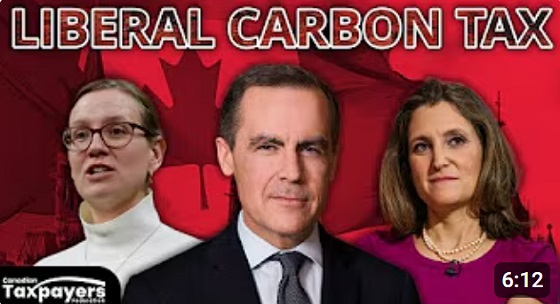Business
Given changes to U.S. policy under Trump, Canada needs to rethink its environmental policies

From the Fraser Institute
By reforming federal climate policy, Canadians could benefit from increased prosperity and increased competitiveness with the U.S., finds a new study published by the Fraser Institute, an independent, non-partisan public policy thinktank.
“As we approach 2030 with no prospect of meeting Canada’s Paris targets, instead of doubling down on costly and misguided policies that will result in continued failure, the federal government should embark on a new course that offers hope for modest climate successes without sacrificing living standards and prosperity,” said Ross McKitrick, Fraser Institute senior fellow and author of Reforming Canada’s Environment Ministry and Federal Environmental Policy.
The study finds that as a result of the new Trump administration quickly reforming U.S. climate policy, Canada risks a widening competitiveness gap with the U.S.
The study identifies five sensible reforms to Canadian climate policy that would improve competitiveness, achieve realistic emission reductions without compromising economic growth and prosperity:
1. Set realistic timelines for achievable improvements in emission intensity.
2. Eliminate the many costly intrusions of climate policy into unrelated policy areas, from banking to homebuilding to competition policy.
3. Make the federal environment ministry an effective and trustworthy source of unbiased, reliable data on Canada’s environment and climate.
4. Push back against the mission creep in multilateral organizations, especially the Intergovernmental Panel on Climate Change.
5. Extinguish in law all forms of climate liability in order to stop nuisance activist lawsuits.
“The federal government’s climate agenda has adversely affected Canadians’ living standards and the country’s prospects for future income growth,” McKitrick said. “Given all the changes occurring in the U.S., now is an appropriate time to reform federal climate policy to be more effective, and to better serve the needs of Canadians.”
Reforming Canada’s Environment Ministry and Federal Environmental Policy
- With the start of a new Trump administration in the US and the prospects of a change in government in Canada, it is time for a reassessment of how Canada manages its environment and climate change portfolios.
- The US has swung dramatically in the direction of promoting energy abundance and downplaying or setting aside climate goals. Canada risks a widening competitiveness gap with the US if we do not respond appropriately.
- This study outlines key reforms to federal climate policy and the structure of the federal environment ministry, including:
- Eliminating the current national greenhouse gas (GHG) emissions targets and replacing them with more realistic ones that can be achieved without compromising economic growth and industrial competitiveness.
- Eliminating the many costly regulatory intrusions of climate policy into unrelated areas, from banking to homebuilding to competition policy, and focusing solely on pursuing cost-effective GHG emissions reductions.
- Transforming the federal environment ministry into an effective and trustworthy source of unbiased, reliable data on Canada’s environment and climate, rather than relying heavily on speculative climate models.
- Pushing back against the mission creep in multilateral organizations, especially the Intergovernmental Panel on Climate Change, and working with other like-minded countries, such as the United States, to return these organizations to their historical mandates.
- Extinguishing in law all forms of climate liability associated with greenhouse gas emissions to prevent activist-driven nuisance lawsuits.
2025 Federal Election
MEI-Ipsos poll: 56 per cent of Canadians support increasing access to non-governmental healthcare providers

-
Most believe private providers can deliver services faster than government-run hospitals
-
77 per cent of Canadians say their provincial healthcare system is too bureaucratic
Canadians are increasingly in favour of breaking the government monopoly over health care by opening the door to independent providers and cross-border treatments, an MEI-Ipsos poll has revealed.
“Canadians from coast to coast are signalling they want to see more involvement from independent health providers in our health system,” explains Emmanuelle B. Faubert, economist at the MEI. “They understand that universal access doesn’t mean government-run, and that consistent failures to deliver timely care in government hospitals are a feature of the current system.”
Support for independent health care is on the rise, with 56 per cent of respondents in favour of allowing patients to access services provided by independent health entrepreneurs. Only 25 per cent oppose this.
In Quebec, support is especially strong, with 68 per cent endorsing this change.
Favourable views of accessing care through a mixed system are widespread, with three quarters of respondents stating that private entrepreneurs can deliver healthcare services faster than hospitals managed by the government. This is up four percentage points from last year.
Countries like Sweden and France combine universal coverage with independent providers and deliver faster, more accessible care. When informed about how these health systems run, nearly two in three Canadians favour adopting such models.
The poll also finds that 73 per cent of Canadians support allowing patients to receive treatment abroad with provincial coverage, which could help reduce long wait times at home.
Common in the European Union, this “cross-border directive” enabled 450,000 patients to access elective surgeries in 2022, with costs reimbursed as if they had been treated in their home country.
There’s a growing consensus that provincial healthcare systems are overly bureaucratic, with the strongest agreement in Alberta, B.C., and Quebec. The proportion of Canadians holding this view has risen by 16 percentage points since 2020.
Nor do Canadians see more spending as being a solution: over half say the current pace of healthcare spending in their province is unsustainable.
“Governments shouldn’t keep doubling down on what isn’t working. Instead, they should look at what works abroad,” says Ms. Faubert. “Canadians have made it clear they want to shift gears; now it’s up to policymakers to show they’re listening.”
A sample of 1,164 Canadians aged 18 and older was polled between March 24th and March 28th, 2025. The margin of error is ±3.3 percentage points, 19 times out of 20.
The results of the MEI-Ipsos poll are available here.
* * *
The MEI is an independent public policy think tank with offices in Montreal, Ottawa, and Calgary. Through its publications, media appearances, and advisory services to policymakers, the MEI stimulates public policy debate and reforms based on sound economics and entrepreneurship.
2025 Federal Election
POLL: Canadians say industrial carbon tax makes life more expensive

The Canadian Taxpayers Federation released Leger polling showing 70 per cent of Canadians believe businesses pass on most or some of the cost of the industrial carbon tax to consumers. Meanwhile, just nine per cent believe businesses pay most of the cost.
“The poll shows Canadians understand that a carbon tax on business is a carbon tax on Canadians that makes life more expensive,” said Franco Terrazzano, CTF Federal Director. “Only nine per cent of Canadians believe Liberal Leader Mark Carney’s claim that businesses will pay most of the cost of his carbon tax.
“Canadians have a simple question for Carney: How much will your carbon tax cost?”
The federal government currently imposes an industrial carbon tax on oil and gas, steel and fertilizer businesses, among others.
Carney said he would “improve and tighten” the industrial carbon tax and extend the “framework to 2035.” Carney also said that by “changing the carbon tax … We are making the large companies pay for everybody.”
The Leger poll asked Canadians who they think ultimately pays the industrial carbon tax. Results of the poll show:
- 44 per cent say most of the cost is passed on to consumers
- 26 per cent say some of the cost is passed on to consumers
- 9 per cent say businesses pay most of the cost
- 21 per cent don’t know
Among those decided on the issue, 89 per cent of Canadians say businesses pass on most or some of the cost to consumers.
“Carbon taxes on refineries make gas more expensive, carbon taxes on utilities make home heating more expensive and carbon taxes on fertilizer plants increase costs for farmers and that makes groceries more expensive,” Terrazzano said. “A carbon tax on business will push our entrepreneurs to cut production in Canada and increase production south of the border and that means higher prices and fewer jobs for Canadians.”
-

 2025 Federal Election2 days ago
2025 Federal Election2 days agoNo Matter The Winner – My Canada Is Gone
-

 2025 Federal Election2 days ago
2025 Federal Election2 days agoASK YOURSELF! – Can Canada Endure, or Afford the Economic Stagnation of Carney’s Costly Climate Vision?
-

 Alberta2 days ago
Alberta2 days agoMade in Alberta! Province makes it easier to support local products with Buy Local program
-

 2025 Federal Election2 days ago
2025 Federal Election2 days agoCSIS Warned Beijing Would Brand Conservatives as Trumpian. Now Carney’s Campaign Is Doing It.
-

 Alberta2 days ago
Alberta2 days agoProvince to expand services provided by Alberta Sheriffs: New policing option for municipalities
-

 2025 Federal Election2 days ago
2025 Federal Election2 days agoInside Buttongate: How the Liberal Swamp Tried to Smear the Conservative Movement — and Got Exposed
-

 Bruce Dowbiggin1 day ago
Bruce Dowbiggin1 day agoIs HNIC Ready For The Winnipeg Jets To Be Canada’s Heroes?
-

 Dr. Robert Malone1 day ago
Dr. Robert Malone1 day agoThe West Texas Measles Outbreak as a Societal and Political Mirror








